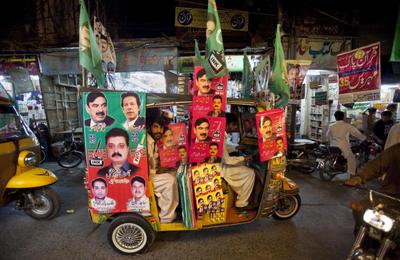In the West, it is sometimes forgotten that Pakistan is so inexperienced with democracy, partly given the success of democracy in India. Following partition in 1947, India forged a democratic path while Pakistan was a slow starter. It took until 1956 for Pakistan to draft an indigenous constitution (India drafted its constitution in 1950).
The new nation of Pakistan remained democratic for a little over 10 years before a coup d’etat saw General Ayub Khan installed as president. Pakistan’s first experiment with autocracy set the stage for an additional three military leaders at the helm of government: General Yahya Khan, 1969–71; General Zia ul-Haq, 1978–88; and General Pervez Musharraf, 1999–2008.
Notably, former President Musharraf has returned to Pakistan from self-imposed exile in the United Kingdom to stand for elections. However, the courts have declared him ineligible to stand for elections and have placed him under house arrest for allegedly imprisoning judges during his last year in power.
Politics in Pakistan are provincial-centric, with each of the major parties having a strong provincial power base.
In Punjab, Pakistan’s most populous province, Imran Khan’s Tehreek-e-Insaf (PTI) jostles for influence with the traditionally dominant Pakistan Muslim League–Nawaz (PML–N) led by Nawaz Sharif, the three-time former prime minister.
In Sindh, the ruling Pakistan People’s Party (PPP) dominates politically, chaired by President Asif Ali Zardari’s son, 24-year-old Bilawal Bhutto, with the Muttahida Quami Movement (MQM) also influential.
Minor parties, like the Awami National Party (ANP) and the Islamic party of Jamaat-e-Islami (JI), are also competing for seats in a coalition government. While the major political dynasties of PML–N and PPP dominate the stage, newer parties like PTI, with the charismatic Imran Khan, are competing for the spotlight.
The lead up to the 11 May election has been bloody. In Karachi, where political tensions and ethnic violence make it one of Pakistan’s most volatile cities, 12 people were killed in a single day on 30 April.
At least 50 people have been killed in pre-election violence since early April, mostly at the hands of the Taliban, who oppose Pakistan’s secular parties. Fears are growing that a major attack will occur in the days leading up to the election.
Former Prime Minister Benazir Bhutto was assassinated just weeks before the last elections in 2008, plunging the country into a state of insecurity which it has struggled to emerge from over the last five years. The recent spate of attacks has also affected voter confidence in the security of polling places, which will be worrying for parties like PTI who are relying on ‘getting out the vote’, particularly the youth vote, in order to capture seats from the long-dominant political duopoly of the PPP and PML–N.
The West should be following the outcome of this election closely. The United States in particular will be watching keenly to see how a coalition government comes together. Media in Pakistan recently reported that the PPP is predicting a coalition between the PPP and Imran Khan’s PTI, with a senior leader of the PPP publically naming Khan as a possible Prime Minister under a PPP-PTI coalition. Khan has publically stated that he will change the course of relations with the United States, with his campaign heavy on anti-US rhetoric. Whether rhetoric translates into reality will be a key concern for Washington, as President Obama’s 2014 transition out of Afghanistan looms large.
However, it is not just Pakistan’s influence in Afghanistan that should have the West interested in the outcome of the election but Pakistan’s potential time bomb of social unrest, economic malaise and chronic insecurity. A new government must come up with a plan to address Pakistan’s myriad problems, and fast. The current government’s lack of policy action to address any problems, particularly economic challenges, must not continue. New policy solutions are desperately needed to stop Pakistan’s increasing slide towards economic and social abyss. This election is make or break time for Pakistan, and will see the country move towards prosperity or languish as one of the most insecure countries in Asia.
Alicia Mollaun is a PhD candidate at the Crawford School of Public Policy, Australian National University, and is based in Islamabad.


While Afghanistan will have little or no impact on the Pakistani elections, it is worth noting that the relations between Pakistan and Afghanistan are particularly tense at present. This comes just as the Obama administration has announced the appointment of James Dobbins, a former ambassador posted to various crisis regions, as special envoy for Pakistan and Afghanistan. He replaces Marc Grossman, who left the job several months ago. In the past week or so, there have been firefights on the border between Pakistan and the Afghan province of Nangrahar, and a delegation from that province has told parliament in Kabul that Pakistani forces have intruded several kilometres across the border, even allegedly distributing Pakistani ID cards to residents. Karzai’s advisors regularly denounce Pakistan to the media. A few days ago, Karzai himself reminded the BBC in an interview that neither he nor any previous ruler of Afghanistan had accepted the Durand Line, mapped by Sir Mortimer Durand in 1893, that marks the border between the two countries, at least as far as the rest of the world is concerned. Given how much weaker than its eastern neighbour Afghanistan is, it is hard to see what geopolitical sense it makes for Karzai to make such statements. Karzai has also just revealed that the US wants nine military bases in Afghanistan after the withdrawal of most of its forces next year. If Karzai approves, Washington will retain a sufficiently large military presence in Afghanistan for the complex and perilous trilateral relationship with Islamabad and Kabul to undergo less change than the expression ‘transition out of Afghanistan’ would lead one to expect.